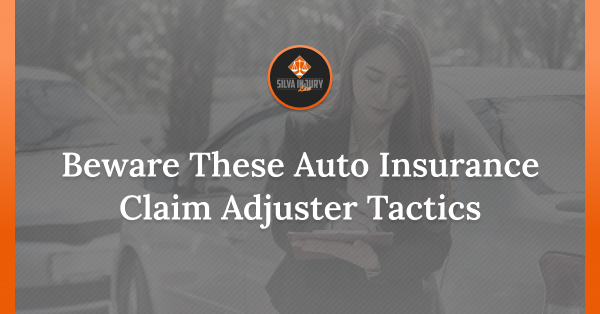
After a car accident caused by someone else’s negligence, you’ll likely want to pursue a claim for damages. However, it would help if you familiarize yourself with insurance claim adjuster secret tactics.
Claims adjusters must prioritize their company’s profits, which means minimizing payouts. They do this in a number of ways.
Some insurance company dirty tricks involve pretending to be your friend, convincing you your claim isn’t worth much, getting you to admit liability, delaying negotiations, discouraging you from hiring an attorney, and more.
Feel free to reach out to us online or call (209) 600-4389 anytime – Our California auto accident lawyers are here to help!
Read on to learn about some of the most common car insurance adjuster tricks you should watch out for when pursuing a personal injury claim in California.
1. Adjusters May Deep Dive into Your Medical History
Insurance adjusters will typically scrutinize your medical history.
They use this to challenge the severity of your injuries and minimize a potential settlement offer. Adjusters may request extensive medical records, sometimes going back several years, hoping to find pre-existing conditions they can use to dispute the cause of your current physical state.
It’s best not to authorize an insurance company to access your medical records directly. Instead, consult an attorney to ensure that only pertinent medical information gets shared with the other driver’s insurance. This approach protects your privacy and prevents adjusters from using unrelated medical history against you.
Remember, while adjusters might present this as a standard procedure, their primary goal is to find reasons to reduce the insurance payout. Your attorney can act as a buffer, ensuring that your rights and interests remain the priority throughout the claims process.
2. Delaying Negotiations or Settlement Talks
Another tactic often employed by insurance adjusters in California is deliberate delay. After a car accident, you may face mounting medical bills and lost income.
Adjusters are aware of this urgency and may exploit it. They intentionally slow down the claims process, hoping you’ll be more inclined to accept a lower settlement as your financial pressure increases.
An experienced attorney can help navigate these delays, ensuring you don’t fall victim to this pressure tactic. They can also explore interim solutions to manage your financial burdens during the settlement process, allowing you to wait for a fair offer without compromising your financial stability.
3. Dissuade You from Hiring an Attorney
Insurance adjusters may try to dissuade you from hiring an attorney. They might suggest that legal representation will only reduce your settlement due to attorney fees. However, this is another car insurance adjuster secrets tactics. The truth is that having an attorney leads to higher settlements, even after subtracting legal costs.
Without legal representation, you may not fully understand your rights or the value of your claim. That is why insurance adjusters prefer dealing with unrepresented individuals.
Your attorney understands the intricacies of insurance claims and is adept at negotiating with adjusters. They protect your rights and work to secure the maximum possible compensation for your losses.
4. Fishing for an Admission of Guilt
One of their tactics is to fish for an admission of guilt. During conversations, adjusters may ask questions designed to make you unwittingly admit fault or partial responsibility for the accident.
It’s essential to be cautious in your interactions with adjusters. Avoid making statements that might be interpreted as an admission of guilt or responsibility. Even seemingly innocuous comments can be used against you to increase your perceived share of liability.
With comparative negligence laws, the more fault the adjuster can attribute to you, the less their company has to pay out. Consider a scenario where you’re 20% at fault. If the adjuster can ramp that up to 40%, they only need to pay you 60% of your damages.
5. Pushing for a Quick Settlement
Early in the process, a claims adjuster may present an offer before knowing the full extent of your damages and future medical needs. This offer might seem appealing, especially if it promises to cover immediate medical expenses.
However, it often overlooks other crucial components like pain and suffering, long-term care costs, and lost future earnings. Sometimes adjusters extend an offer early on as they know your claim could become worth much more down the line.
Accepting such a settlement can be risky. Once you sign a release, you forfeit the right to seek additional compensation, regardless of how much your injuries end up costing. It’s crucial to thoroughly understand the extent of your injuries and their long-term impact before agreeing to any settlement. That’s where an experienced California car accident attorney can help.
6. Adjuster Acts Like a Friend
Adjusters might adopt a friendly demeanor, making it seem like they genuinely care about your well-being. However, the empathetic appearance is likely all a facade. Remember, their goal is to gather information that helps them reduce their company’s payout.
Be cautious in your interactions with adjusters. Friendly conversations can lead to casual remarks or admissions that negatively impact your claim’s value. The adjuster’s loyalty is to the company, not you. Always keep communication professional and consider hiring an attorney. When you’re represented, the insurance company must communicate through your lawyer.
7. Combing Through Social Media for Evidence
Some adjusters will meticulously comb through your social media accounts, looking for posts, pictures, or comments that could contradict your injury claims or suggest liability. For instance, a photo of you engaging in physical activity after the accident could be misconstrued to prove that your injuries are not as severe as claimed.
Adjusters can also use your friends’ posts against you if they tag you in something that could conceivably cast doubt on your claim. It doesn’t matter if it’s a late post from months before the accident; the photo might be enough to raise doubts in a jury’s mind.
Be mindful of your social media presence during the claims process. Limiting your social media activity and tightening privacy settings can help protect you. However, most attorneys will tell you it’s best not to post or be active on social media after an accident.
8. Requesting a Recorded Statement Without Representation
Recorded statements may seem like a standard procedure, but there’s always an underlying motive here.
Adjusters aim to get you on record, potentially using your own words against you later in the claims process. They are skilled at asking leading questions that might cause you to downplay your injuries inadvertently or even imply partial responsibility for the accident.
It’s crucial to approach any request for a statement with caution. You are not obligated to provide a recorded statement to the other party’s insurance adjuster, especially without legal representation. Doing so can jeopardize your claim, as adjusters can use your words to challenge the severity of your injuries or your account of the accident.
Before agreeing to any recorded statement, consult with an attorney. If you have an attorney, the insurance company cannot force you to give a recorded statement before proceeding with your claim.
Have Questions About Insurance Claims After An Accident? Contact Our California Car Accident Lawyers
Knowing what to do following a car accident in California can feel overwhelming, especially when dealing with insurance companies. Even if you think you’re prepared, insurance claim adjuster secret tactics can catch you off guard.
Fortunately, Silva Injury Law stands ready to help. Our experienced team is well-versed in the underhanded tactics many insurance companies use. Attorney Michael Joe Silva is committed to getting justice for his clients and will fight tirelessly on your behalf.
If you’re dealing with an insurance claim and want to avoid falling prey to an insurance adjuster’s tactics, don’t hesitate to contact us online or call (209) 600-4389 today for a free consultation. Let us deal with the insurance companies so you can focus on your recovery.

















 EMAIL
EMAIL  Ask AI
Ask AI  Access
Access